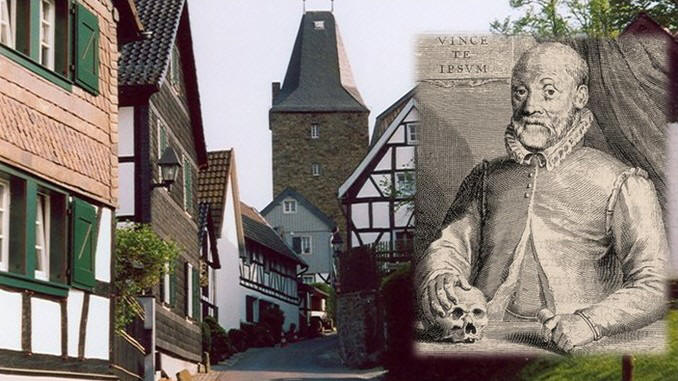
The stone crucifixes from the 17th and 18th century all along the “Petersberger Bittweg”, the ancient procession way from Königwinter city to the chapel on Mount Petersberg, remind us of the early modern period in the Siebengebirge. . The years that the locals set up these crucifixes correlate with years of wars and plagues in the Rhineland.

Lutherans, Calvinists, Anabaptist
At first, the Protestant Reformation had only little resonance in the catholic Rhineland. Yet, archbishop Hermann von Wied of Cologne saw that reforms were necessary and urgent, and eventually, he called protestant theologians into his lands. Emperor Charles V fiercely fought reformation, but the wars in Europe and against the Turks kept him away for years. In the second half of the 16th century, we find Lutheran, Anabaptist, and Calvinist parishes in our region. The Anabaptists, however, were persecuted.
The Defenestration of Prague in May 1618 led to a terrible war. Soon it was no longer just about religion, but about domination in Europe. Fighting, plundering and pillaging took place everywhere. These were terrible years. In 1632/33, foreign troops conquered and destroyed the castles on the Drachenfels and Löwenburg.

Absolutism and Wars of Succession
In his struggle to obtain predominance in Europe, Louis XIV of France repeatedly imposed wars on his neighboring countries.
Back then, most villages on the right side of the Rhine were part of the Duchy of Berg. Since the end of the 17th century, the Duke of Berg was also Count Palatinate. The town Königswinter with the castles Drachenfels and Wolkenburg belonged to the archdiocese of Cologne, the archbishop resided in Bonn. Both rulers in the Rhineland were repeatedly drawn into the wars of succession among the great powers.
Witch hunt
The witch trials are a dark chapter from the early modern times until the middle of the 18th century. In the territories of the archbishops of Cologne and the Counts of Berg, hundreds of people were arrested for being witches or sorcerers, tortured and sentenced to death on a stake.
In 1486, the Dominican Heinrich Kramer published his book Malleus Maleficarum (“Hexenhammer” in German, hammer of the witches), in which he legitimized the persecution of witches. Martin Luther, too, thought that some people made a pact with the devil and received magic powers to do a lot of damage. Therefore, they had to be persecuted. “You must not allow the sorceress to live”, as written in the Old Testament. John Calvin thought the same. The peak of the wave of persecution is between 1550 and 1650, estimates speak of 40,000-60,000 executions.
Dr. Weyer
One the courageous fighters again the witch trials was Dr. Johannes Weyer (1515/15-1588), the personal physician of our tolerant sovereign Duke Wilhelm V. von Berg. Under the protection of the duke, he wrote his book “Vom Blendwerk der Dämonen” (Of the deception of demons) in 1563, in which he protested against the cruel witch trials.
A look beyond the Rhineland
During the time of religious division in Germany, the House of Tudor reigned in England. King Henry VIII (1509 to 1547) broke with the Catholic Church in Rome. His fourth wife Anne of Cleves was Duke William’s sister.
In 1607, English settlers founded Jamestown in Virginia, in 1620, the Pilgrim fathers sailed to North America. Decades later, the colonies were growing. Pennsylvania, named after its founder William Penn, was one of them. Twice Penn came to Germany, to promote settling in his colony. In 1683, 13 Quaker and Mennonite families from Krefeld around Franz Daniel Pastorius, the “Original 13” sailed on the “Concord” to North America. Other European powers built up colonial empires as well, and soon the European wars over succession were fought out in the colonies too. (French and Indian War 1754-1763).
Early Modern Period
Intro Early Modern Period | Lutherans, Calvinists, Anapabtists | Absolutism and wars of succession

Be the first to comment